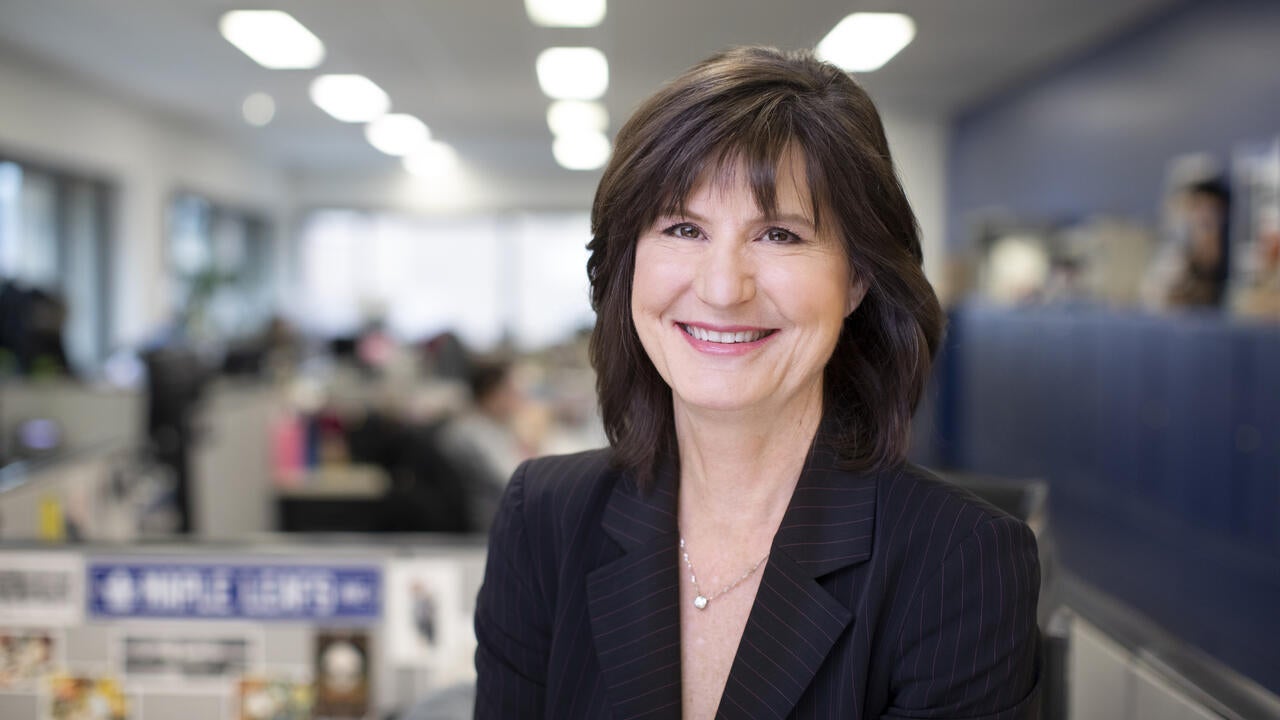
Arts 2021 Alumni Achievement Award
President and CEO of Kids Help Phone, Katherine Hay (BA '98), leads Canada’s only national 24/7 bilingual e-mental health service for young people

President and CEO of Kids Help Phone, Katherine Hay (BA '98), leads Canada’s only national 24/7 bilingual e-mental health service for young people
By Arts Advancement Faculty of ArtsKathy Hay earned her BA with a major in Psychology in 1998 — but it wasn’t a straight line from start to finish. Beginning her undergrad studies in 1979, she paused university to pursue a career in banking. Nearly 20 years later she completed her degree through Waterloo’s distance learning option. Now as a former banker, Kathy has brought a strategic and business lens to her roles in the not-for-profit charitable sector. She is currently President and CEO of Kids Help Phone, leading the strategic direction and culture of Canada’s only national 24/7 bilingual e-mental health service for young people. Previously, she was President and CEO of Women’s College Hospital Foundation for which she was named one of Canada’s Top 25 Women of Influence in 2017. She has also held senior roles at the University of Toronto, the University of Guelph, and the Art Gallery of Ontario. Under Kathy’s leadership, Kids Help Phone counsellors and crisis responders had over 9 million interactions with youth across Canada since 2019.
What do you want people to understand about the needs of children and youth who call Kids Help Phone?
As pioneers in virtual care and the country’s expert in e-mental health solutions, a typical day at Kids Help Phone is supporting kids as young as 5 all the way through to young adults, 24/7 and nationwide. We always say that no problem is too small, and no problem is too big. Our goal is to be there for youth when, where and how they need us to be.
During COVID-19, youth have had a particularly tough time across the country, with many equity-seeking populations being disproportionately impacted as well. Kids Help Phone has been there for any and all issues — from anxiety and depression, loneliness, fear, abuse and suicide ideation. Because we are not only a youth charity, but also an innovation/technology not-for-profit, we knew we had work to do and I am proud to say that we did not go dark for one minute.
What I want people to know, young and not so young, is that Kids Help Phone will be there for you no matter what.
During the last 20+ months of unprecedented events, what was the most critical decision you made for Kids Help Phone response?
Kids Help Phone was facing challenges that every other company was facing: how to keep things going with so much uncertainty. And what was at stake for Kids Help Phone if we did not succeed was not our share price, but the wellbeing of the youth across Canada.
The ability of Kids Help Phone to respond to this crisis was actually based on a decision made three years before, long before a global pandemic. It stemmed from the recognition that steady state for the only e-mental health solution provider in Canada, was not an option because youth were changing faster than ever and technology even faster. Everything we do is based on technology and innovation.
We recognized that we were in fact a technology/innovation charity that has a razor-sharp focus on youth and mental health. That monumental mindset shift in October of 2018 set the stage for March 2020, ensuring we were built for scale to meet the enormous demands. Since March of 2020, Kids Help Phone has provided service to youth across Canada more than 9M times!
How can people support for Kids Help Phone as volunteers?
Kid Help Phone is shored up by staff, clinicians, volunteers and donors that span the country. Along with the 400 staff and clinicians it is humbling to have more than 4,000 volunteers stand up in supporting the youth of Canada, either as frontline volunteer crisis responders, or as community fundraising champions or on strategic committees and the Board of Directors. Volunteers go through our robust training program to be crisis responders through to community volunteers. For anyone wanting to volunteer to help have a true impact in the wellbeing of youth across Canada, thank you!
That cliche — it takes a village — stands true, and yet from my vantage point, what I see is an entire country doing what it takes to raise the youth of Canada, our future.

Read more
Meet the 14 exceptional students representing Waterloo’s newest grads

Read more
With AI, manufacturing and green tech-focused companies, Waterloo-linked innovators are scaling businesses for global impact

Read more
GreenHouse awards $10,000 to student ventures and changemakers aiming to transform livelihoods within disadvantaged communities
The University of Waterloo acknowledges that much of our work takes place on the traditional territory of the Neutral, Anishinaabeg, and Haudenosaunee peoples. Our main campus is situated on the Haldimand Tract, the land granted to the Six Nations that includes six miles on each side of the Grand River. Our active work toward reconciliation takes place across our campuses through research, learning, teaching, and community building, and is co-ordinated within the Office of Indigenous Relations.